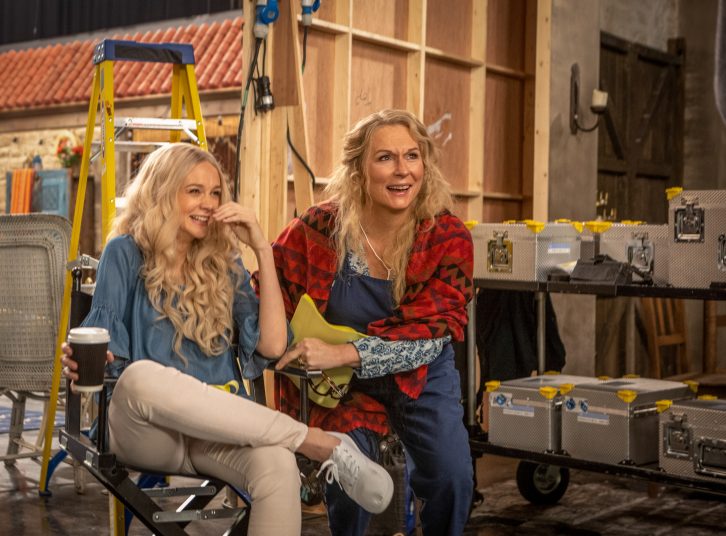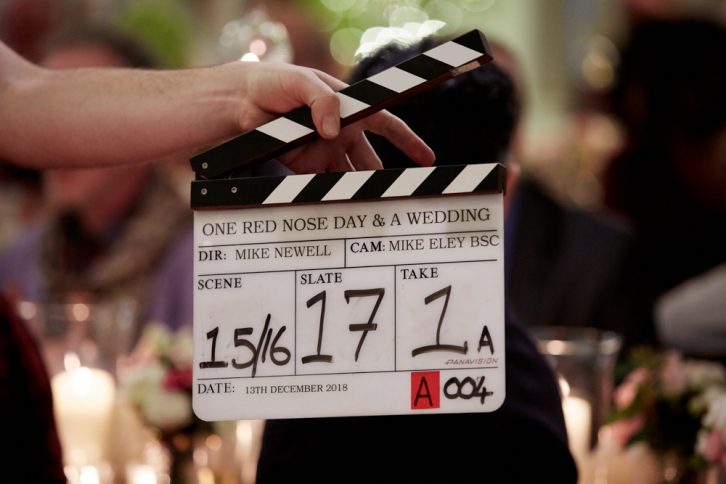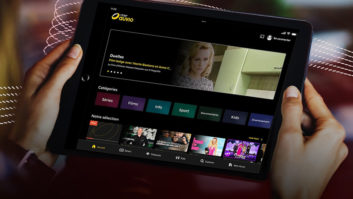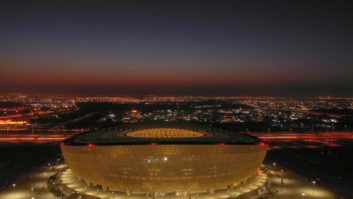They say the essence of comedy is timing, an idea borne out by the production of Red Nose Day – one of the biggest nights in the BBC calendar. “You have to bide your time sometimes,” executive producer Colin Hopkins tells TVBEurope. “If you commit to a sketch early and you spend money on it then you can get to a point down the line when your budget runs out because sketch shows are so expensive. So let’s wait to make a decision on that sketch because we don’t know what’s going to come up.”
“The other thing we try and do is respect Children in Need, because obviously both shows are asking favours because none of the talent get paid,” adds showrunner Peter Davey. “We try to not engage with too many people while they’re still in production because that just muddies the water if they’re asking and we’re asking – so we try and give them a run at it up until their show in November and then we’ve got a nice clear run until March.”
Produced by BBC Studios, this year’s show takes place on 15th March at BBC Studioworks’ Studio D at BBC Elstree Centre, marking the biennial live event’s return to a TV studio following 2017’s broadcast from the O2 Arena, which suffered from sound issues. “There was a very solid editorial justification for doing it there,” says Davey, “in that the team and the network wanted to make it a bit more comedy-centred, a bit more comedy clubby, so they went for the O2 and then I think they realised pretty much on the day that because of the way the audience was configured, it was almost impossible to stop the babble of background noise.”

The use of the studio not only allows for control over sound but also includes a regional opt-out, as Davey explains: “Every single BBC region gets involved so they’ll all be doing bits and pieces from their regions. We’re also using the news studio in a slightly different way this year – so the classic W1 news headquarters will feature. And then all the OBs are coming through the regional opt-out. So pretty much everyone round the country will be doing bits and pieces and feeding in – whether they’re doing OBs on the day or whether they’re just sending out their news crews to cover the week before, that’s where all that comes from. The goal is to get every single region, every single part of the BBC family involved, representing what they’re doing to help.”
The other major part of the show comes in the form of Comic Relief appeal videos, produced using small crews usually comprising a single camera operator, a producer and sometimes a researcher. “I think in terms of what they try not to do is be intrusive,” says Hopkins. “So when they go anywhere, whether it’s a UK project or abroad, they can’t take a big crew with them because I think that would be too intrusive for the environments and the places they’re in.”
At the same time, it’s important that the comedy sections of the night don’t intrude on these serious appeals. “Richard Curtis sort of cracked the code as it were,” Hopkins remarks. “I think all appeal shows like this have followed his lead and Comic Relief’s lead, in that he realised that actually if you come off the back of a very serious hard-hitting film, if you then suddenly said ‘and here’s something really funny’, more so than the jar of it, it doesn’t allow anybody to pick up the phone and actually donate.

“People don’t donate whilst the films are on, they tend to donate afterwards,” he continues. “So what Richard did many moons ago was actually build in time off the back of each of the films to allow people to donate. He realised that off the back of the most hard-hitting films he’d put an emotional music performance, which would then reflect imagery and text that allows people during that performance to give.”
In terms of donating, this year’s Comic Relief broadcast offers the British public a new incentive. “The biggest asset we have on Comic Relief is the goodwill of the creative community,” says Davey. “We’ve been given effectively a money-can’t-buy experience, and we’re going to give that away as a thank you on the night which is something we’ve never done before. I can’t really tell you about it but it will be a big deal – you won’t be able to miss it on the night!”
“The other thing I can talk about is our celebrity phone bank,” Hopkins reveals. “We’re sort of going back to the ’80s a little bit, and after the news there’ll be 18 or 20 celebrities that will be on desks with old-school phones on the middle of the stage with our hosts that will be there to take calls – so if you phone up to donate you may get through to, I don’t know, Jamie Redknapp for example, or you may get through to somebody from Made In Chelsea, or whoever we book!”

Of course, to get people donating, the producers first need to get them watching, which means keeping the entertainment family-friendly – at least until the watershed. “Effectively our watershed is 10pm,” explains Davey, “because it’s a Friday night and the kids start watching it – and as long as we deliver a good enough programme, the hope is that they’ll stay watching it. So you’ve got to assume that kids aren’t going to bed on the dot of 9pm and they’re allowed to stay up as a treat until 10pm so we take our watershed on the night til 10pm.
“The content needs to reflect the fact that families are viewing, and if it doesn’t there’s a very clear reality that if you do something edgy or not suitable the kids will be sent to bed and the parents will turn over, and then the donations will go down. So you’ve got to be aware that you’ve got to make good old-fashioned entertainment, broad entertainment, hopefully that’s funny.”
That’s comedy for you – all a matter of timing.





